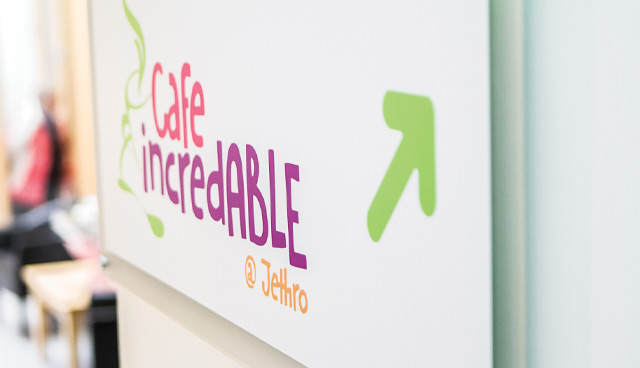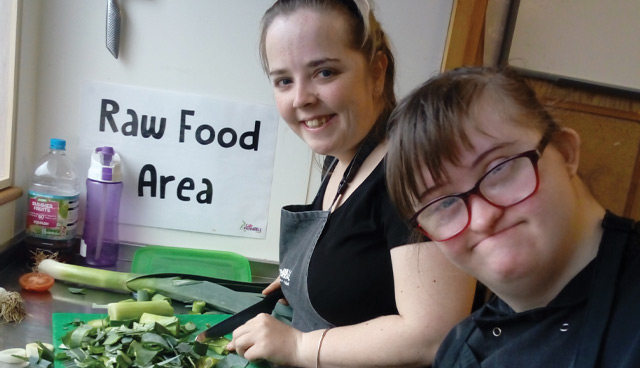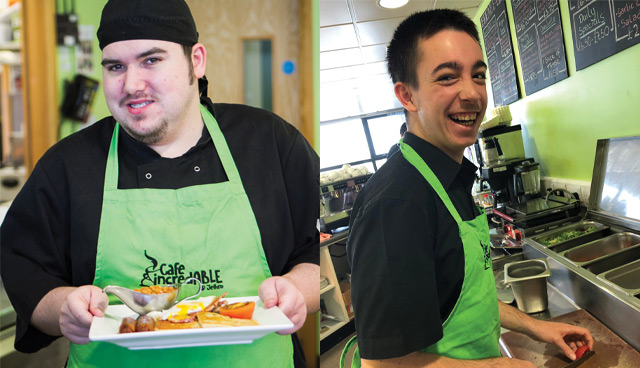Value added employment

Nigel Hampton, Director of IncredABLE, discusses the pathways to meaningful employment provided by the organisation and provisions for differentiated support needs.
Initiated in 1997 by a group of parents who identified a need for greater opportunities for young people with learning disabilities and autism to socialise with their peers, IncredABLE, which the organisation was rebranded as on its 20th anniversary, has continued to grow, building a diverse range of support services.
Both a registered charity and a social enterprise, the wide-ranging portfolio of IncredABLE’s services support over 600 young people annually. As well as the likes of residential retreats, youth clubs and bespoke community care, the organisation also has a focus on value added employment through its social enterprises.
As Hampton sets out, these enterprises, staffed by a mixed-ability workforce, come in the form of the award-winning high-street restaurant and adjoining training facility Café OneEighty in Portadown and Café IncredABLE at the Jethro Centre in Lurgan.
Both public-facing cafés offer training and work placement to individuals with learning difficulties and autism, with a stated objective of furthering their ambitions to gain meaningful employment in the hospitality industry.
Café OneEighty is a standalone facility, with an annual intake of trainees aiming to achieve their level one qualification in hospitality.
“The café’s trainees begin their three-year learning journey at OneEighty where they study for a Level One Qualification in catering and hospitality. When the time is right, some of these trainees transition across to Café IncredABLE on work experience,” explains Hampton.
Café IncredABLE, which opened in February 2018, operates within the Jethro centre and provides further experience for those individuals seeking to gain subsequent employment outside of the social enterprise. The café has a synergy with the community centre in which it is embedded. Not only does the relationship mean increased footfall for the café but also brings added value to the local community and those using the centre.
“Our social purpose very much echoes their mission and it has a two-fold benefit of not only exposing our trainees to wider community interaction but also benefiting the community in terms of their understanding of the capability and talent of our trainees,” explains Hampton.
Illustrating the importance of IncredABLE’s focus on value added employment, Hampton says: “What the cafes offer is a ‘real life’ experience of the working environment. It equips individuals with greater skills and awareness, which in turn better prepares and enables them to transition to a third party employer.”
Most of the social enterprise trainees which apply to join the various programmes typically attend local Special Education Needs (SEN) schools or learning support units. “What’s often overlooked is that a person with a learning disability or autism may be in full-time education until the age of 18 to 19. However, after that, the pathways are limited,” explains Hampton.
IncredABLE’s enterprises aim to:
- target young people who currently have no meaningful day time occupation;
- provide participants with work focused experience in a social enterprise environment;
- involve participants in all aspects of daily operations from design, product development, production, marketing and sales; and
- prepare young people for further work-based training by building confidence and self-esteem through the development of transferable job skills.
“It’s important to note that individual support needs vary. In catering for a wide range of support needs – be those behavioural, physical or sensory — we recognise the importance of creating an environment in which individuals can thrive and benefit.
“Paid employment is valuable to us all in that it provides an independence and improves our self-worth. In creating an environment which is more sensitive to and understanding of the necessary supports of the individual, the cafes help to prepare for that transition to further employment. Crucially, it also is proven to be a successful element of maintaining that employment.”
Indeed, recent studies have pointed to wide-ranging economic benefits of increasing the opportunities for individuals traditionally excluded from the labour market including in the areas of housing, health, employment and training and in social care.
Quizzed on whether he feels there has been, in recent years, a greater awareness from business and the private sector about the mutual benefits partnering with social enterprises for employment opportunities, Hampton believes the answer is equally yes and no.
“The awareness has improved but undoubtedly much more can be done,” he states. “The challenge lies in getting in front of employers, telling the story, and asking for their consideration. Since its establishment in 2011, OneEighty has an 80 per cent rate of transitioning trainees into paid employment. This is something that needs to be maintained and we’re constantly engaging with employers to increase the number of individuals with learning difficulties and autism they bring on board.”
“However, I don’t believe there is enough understanding of the wider benefits of social enterprises and how they can assist in re-balancing the economy.”
An important aspect of the social economy is the sustainability of those organisations within it. Creating a sustainable business model means a broader reach and more opportunities for individuals to access meaningful employment. To this end, Hampton spells out the ambition for IncredABLE to diversify further in terms of their social enterprises.
“In parallel with what we are doing in hospitality we are trying to create more social businesses within our organisation to engage and employ people.”
Hampton describes the piloting of a series of micro-enterprises, such as chocolate-making, which once fully assessed, could be scaled up.
Such models are particularly important in the context of the UK’s departure from the EU. While IncredABLE’s cafes do not rely on funding from the European Social Fund (ESF), many in the supported employment sector do. Current funding is secure only to 2022, with no clear direction beyond that.
“With that in mind, we’re looking to develop social businesses which are not reliant on an external funding model. It’s a more difficult approach because it’s a longer journey,” says Hampton.
He explains how IncredABLE’s wider portfolio of services, not just their social enterprises, enables a degree of flexibility for their various offerings to “cross-pollinate” and ensure a degree of stability in terms of funding. The organisation has built up a noticeable asset base which allows for financial leverage and various funding streams evidently provide greater security.
However, he maintains that the central ambition is for the social enterprises excel and grow. Concluding, Hampton says: “The challenge is to keep spreading the message that by buying social you are giving people with autism and learning difficulties real-life work experience and training opportunities, facilitating their transition into the wider employment market. This in turn has many benefits for changing the economic mix.”







